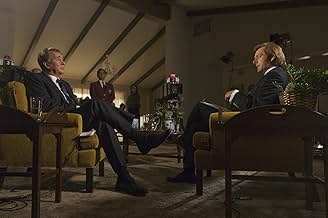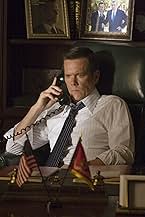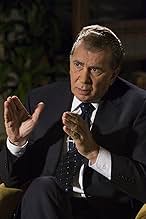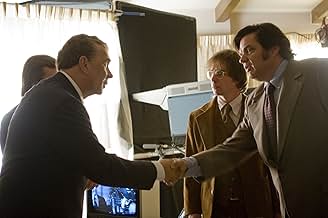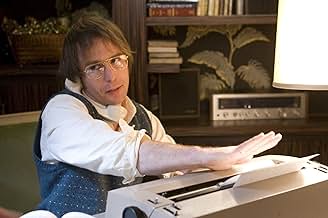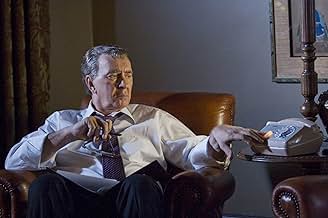Três anos após sair da Casa Branca, Nixon vai dar uma entrevista ao jovem David Frost, para se reabilitar e voltar à política. Mas o que se seguiu foi um duelo televisivo seguido por milhões... Ler tudoTrês anos após sair da Casa Branca, Nixon vai dar uma entrevista ao jovem David Frost, para se reabilitar e voltar à política. Mas o que se seguiu foi um duelo televisivo seguido por milhões de pessoas ao longo de quatro noites.Três anos após sair da Casa Branca, Nixon vai dar uma entrevista ao jovem David Frost, para se reabilitar e voltar à política. Mas o que se seguiu foi um duelo televisivo seguido por milhões de pessoas ao longo de quatro noites.
- Indicado a 5 Oscars
- 23 vitórias e 81 indicações no total
Avaliações em destaque
I have a personal dislike for Ron Howard as a director, a result of my sensibilities mainly, I suspect. Howard strikes me as a particularly heavy-handed, didactic director who has wasted many great concepts on mediocre films (out of 18 films I've seen by him, I only genuinely liked "Apollo 13". I was expecting the worst with "Frost/Nixon", but instead was met with one of the most entertaining films in a while, and a remarkably well-acted, even-handed, quality character study. I suppose I should have been prepared for a quality screenplay given the success of this Peter Morgan play in New York and London, but I was hardly expecting something this good. It's glib, funny, well-paced, expertly-structured, clever, observant, and intelligent. It creates a fascinating Nixon, played brilliantly by the great Frank Langella, though this is not quite up there with the likes of Oliver Stone's sadly under-appreciated "Nixon" or Robert Altman's endlessly fascinating "Secret Honor". The film is almost surprisingly well-directed, although there is a bit of the old TV trick of shaking the camera a bit, panning too often, to give the illusion of motion and energy when there's really just people in a room talking. The conversation's interesting enough, there's no need for that. Oh well, I suppose I am nitpicking.
As far as Nixon movies go this is lightweight entertainment with plenty of comic moments largely leading up to two or three scenes of real human vulnerability. Aside from these scenes (which are truly, truly excellent), Peter Morgan conceives the meeting as something of a chess match with the unpredictability of a boxing match. To use J. Hoberman's words 'a prize fight between two comeback-hungry veterans, only one of whom could win'. On paper this could have been very heavy on amateur psychoanalysis and low on entertainment value but Morgan and I suppose Howard as well are clever enough to have some fun with the idea. This is not a criticism at all, the film has moments of surprisingly real depth and intellectualism, but overall the nature of the script works in its favor, makes those scenes more interesting, more ultimately rewarding.
"Frost/Nixon" is an entertaining, exciting film, around as populist as I expected but in a very different way. This is the sort of writing we don't see enough of, particularly not in today's films. It's vaguely reminiscent of a particularly good BBC television drama. The cast is certainly good enough for that. Langella and Michael Sheen are outstanding, both manage to accurately portray the real-life men they are portraying while still adding some characterization and mannerisms of their own. Langella's Tony-award winning performance might be up for Oscar consideration soon, but Sheen's Frost almost upstages him at times. No heavy-handedness, no political 'messages', just a fun, clever script and a great cast in a well-made film.
Truly... An Historic Encounter of 2 great personaliies... Presented with panache and gripping dramatic flare!
The morning after the Watergate break-in, I brought the newspaper to my university, showing the brief article to everyone who would look. "Tricky Dick is at the bottom of this" I insisted..."NO! He wouldn't be that Stupid!" most of them replied.
In Nixon/Frost we get an insightful look at a gifted, multi-faceted, conflicted personality in all its haunting glory. Nixon was many things. Stupid was not one of them. A Ron Howard Movie about a TV interview? I was very skeptical, to say the least. One single viewing made me a true believer.
Ron Howard has crafted an instant Classic masterpiece. Ripe with couched metaphors and subtle tripwire dialogue, the film's power flows from Ron Howard's ability to present us with the cinematic equivalent of a 100 minute TV close-up of its title characters. Frost/Nixon turns a microscope on both Nixon's strengths and a shopping list of inner demons. Simultaneously vindictive, petty, rancorous, insecure and ever ready to play the victim, more than anything else, Frank Langella's uncanny performance evokes not any hatred, but great pathos.
History is replete with flawed geniuses. But only during the past half century or so... has there been a media obsessed with exposing them for the entire world to see. Michael Sheen is inspired as David Frost, undergoing a great onscreen catharsis. And the re-creation of the interviews is sublime! Cleverly and convincingly Presented as two deftly talented sparring partners, Frost/Nixon is an immensely entertaining/informative slice of history that should satisfy even the most discerning cinematic gourmet.
ENJOY! / DISFRUTELA! 9*********
It's important that the fakery should work well, because the movie must provide lots of closeups that those in the balcony didn't see. So long as it works, the feeling of TV interviews is better achieved in the film, and the actors don't have to yell. The camera, sometimes annoyingly jerky, but in the best moments simply direct and relentless, does their yelling for them.
So I'm saying this is a winner. Peter Morgan after all did the screenplay, and he's no stranger to such efforts--notable examples of his film writing are in The Last King of Scotland and The Queen; a rather less notable one is The Other Boleyn Girl. The flaws are simply in the events. For three of the interview parts, till it gets to Watergate in the fourth, Nixon seems to be winning. Despite a dramatic intervention by Nixon support staffer Col Jack Brennan (Kevin Bacon) to prevent an abject breakdown, Nixon does buckle under in part four. But his admissions still remain in the realm of generality, and there is the question: does anything said on TV really matter? The audience for a West End or Broadway play is a bit different from the popcorn crowd and how appealing this film will be to the mainstream is uncertain. Needless to say it's all talk and minimal action. For students of contemporary American history nonetheless the topic is thrilling. Frost used his own money for down payments. In need of cash and highly mercenary, Nixon used the celebrity agent Swiftie Lazar (Toby Jones) to get $600,000 for the interviews. Frost lost sponsors and the US networks refused to come aboard. He made down payments from his own funds and borrowed. He hired two journalists, Bob Zelnick (Oliver Platt) and James Reston (Sam Rockwell), to do support research. Reston was a firebrand opponent of Nixon. He refused to participate unless there was a commitment to shame Nixon and get him to admit he did wrong in Watergate and betrayed the country's trust.
The issue was whether Frost had the depth to tackle a job like this. He wanted a Watergate confession too, but he let Nicon play him with small talk (despite the man's claim that he was no good at it) and temporize with lengthy self-serving reminiscences that blunted most of Frost's pointed questions. This is where Zelick and especially Reston come in to give a sense of urgency. Again the film excels where the play couldn't in showing Nixon's walk out to his car after each encounter, jubilant at first, pathetic at the end.
Ultimately both in the play and the film, Frost's victory seems a hollow one, of little significance to morality or history. This is above all a story about television. In that arena, this was a coup. and there is great drama in how close Frost's project came to failing. As the encounters got under way, he was losing every sponsor, and later he lost his Australian show, having some time earlier lost his American one. The film tells us they all came back, and then some. Frost never really seems to have reentered the world of American television, but he has had many projects in England and is said now to be "worth £20 million," with a live weekly current affairs program on Al Jazeera English. Nixon is dead, and though he may have won three rounds out of four in the Frost interviews, his legacy is tainted.
The show belongs to Sheen and Langella, but Bacon is excellent as the stiff, loyal Col. Brennan, and Sam Rockwell strong in an unusually serious role for him. As Nixon's somewhat lost wife Pat, the child star of The Bad Seed Patty McCormack is touching. There are lots of other actors, far more than in the stage production, and the best thing is they don't get in the way. San Clemente also plays a significant role. The brightness and beauty of Nixon's ocean-side estate helps dramatize his depression by contrast. There were doubts about putting Howard in charge of the screen version, but they were groundless.
But what Frost/Nixon - and in particular Langella - does is give humanity to the man. We see his arrogance, his love of power, his need to win (hinted at wonderfully in a moment when he is jogging in his San Clemente home to rousing music), but we also see his inner conflicts, his regrets, the fact that perhaps more than simply his crimes regarding Watergate haunted him - that the impact of his decisions on South East Asia were not entirely remote from him, either. And in a sequence that I will not reveal, to avoid spoiling the plot, we also see a hint of his madness, for it is that, I think, rather than senility. (You have to see it to understand this.)
Ron Howard and playwright/screenwriter Peter Morgan have achieved a remarkable feat in adapting the stage play, which sadly I did not see. Not for a moment does this feel stage bound; instead it is a compelling human portrait of two men - for Frost is fascinating, too, and Michael Sheen captures both his much criticized (at the time) surface gloss and also his deeper fears - but above all of the impact that each of our decisions, large and small, and not least if you are leader of the "Free World," have on us all.
Você sabia?
- CuriosidadesFrank Langella and Michael Sheen repeated the roles they created on stage. Ron Howard would only agree to direct if the studio would allow both actors to appear in the film version.
- Erros de gravaçãoFrost and Nixon behave as if they've never met before. In real life, Frost interviewed Nixon when he ran for president in 1968. Nixon enjoyed the interview so much that after he was elected, he met with Frost in the White House to discuss producing a television special.
- Citações
Richard Nixon: That's our tragedy, you and I Mr. Frost. No matter how high we get, they still look down at us.
David Frost: I really don't know what you're talking about.
Richard Nixon: Yes you do. Now come on. No matter how many awards or column inches are written about you, or how high the elected office is, it's still not enough. We still feel like the little man. The loser. They told us we were a hundred times, the smart asses in college, the high ups. The well-born. The people who's respect we really wanted. Really craved. And isn't that why we work so hard now, why we fight for every inch? Scrambling our way up in undignified fashion. If we're honest for a minute, if we reflect privately, just for a moment, if we allow ourselves a glimpse into that shadowy place we call our soul, isn't that why we're here? Now? The two of us. Looking for a way back into the sun. Into the limelight. Back onto the winner's podium. Because we can feel it slipping away. We were headed, both of us, for the dirt. The place the snobs always told us that we'd end up. Face in the dust, humiliated all the more for having tried. So pitifully hard. Well, to *hell with that*! We're not going to let that happen, either of us. We're going to show those bums, we're going to make 'em choke on our continued success. Our continued headlines! Our continued awards! And power! And glory! We are gonna make those mother fuckers *choke*!
- Cenas durante ou pós-créditosMichael Sheen and Frank Langella are credited simultaneously before the title. Sheen's name is on a lower level, but further to the left; while Langella's is higher up, but pushed to the right. Therefore, depending on whether you read the card top-to-bottom or left-to-right, either actor can be seen as being credited first.
- ConexõesFeatured in At the Movies: Summer Special 2008/09 (2008)
- Trilhas sonorasBy George It's David Frost
Written by George Martin (as George Henry Martin)
Performed by Atli Örvarsson
Principais escolhas
- How long is Frost/Nixon?Fornecido pela Alexa
- Is "Frost/Nixon" based on a book?
- Who played Nixon in the stage play?
Detalhes
- Data de lançamento
- Países de origem
- Central de atendimento oficial
- Idioma
- Também conhecido como
- Frost/Nixon - La entrevista del escándalo
- Locações de filme
- Palos Verdes Estates, Califórnia, EUA(Nixon "San Clemente" Compound)
- Empresas de produção
- Consulte mais créditos da empresa na IMDbPro
Bilheteria
- Orçamento
- US$ 25.000.000 (estimativa)
- Faturamento bruto nos EUA e Canadá
- US$ 18.622.031
- Fim de semana de estreia nos EUA e Canadá
- US$ 180.708
- 7 de dez. de 2008
- Faturamento bruto mundial
- US$ 27.426.335
- Tempo de duração2 horas 2 minutos
- Cor
- Mixagem de som
- Proporção
- 2.35 : 1
Contribua para esta página








